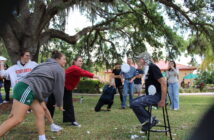There is a clichéd notion that “one man’s trash is another man’s treasure.” In some instances this may be true, but in others it is completely false. One such instance of the latter I have discovered is working over the summer as a housekeeper cleaning the residence halls on campus. The job is not pretty or easy but it has to be done, so I am here with a few cleaning tips to help make housekeeping’s job easier and help you stay happy and healthy.
All that Glitters is not Gold:
Many students may love the sparkle and pizzazz that glitter can bring to their projects, makeup and costumes, but glitter is a pain to clean for one simple reason: it gets everywhere and sticks to everything you don’t it to stick to. Glitter is hard to miss in terms of sight but easy to miss with a vacuum or a damp cleaning rag. With said damp rag, some glitter is collected as intended, but is soon deposited on another surface when that glitter-plagued rag is used to clean again. Vacuums blow air out through vents to keep from overheating, this air in turn can disrupt the resting glitter and circulate it around the room, thus making a bigger mess.
One way to help prevent the mess of glitter, other than simply not using glitter, would be to apply glitter to the desired object while on a large sheet of paper or a paper plate. Should any glitter be spilled, it would end up on the paper or the plate and not in drawers, on the floor, or in your eyes and skin. Once your glitter project is finished all you have to do for cleanup is fold the paper with the glitter inside of it or take the plate of excess glitter and slide it carefully into a proper trash receptacle.
It Takes a Lot to Break this Mold and Mildew:
Florida is notorious for rainy weather, which means there will be mud and wet clothes—both of which could lead to mold growth in some buildings, like the open-air halls of Rodrick and Alumni. Florida is also hot and humid, urging students to make full use of their air conditioning units to find reprieve from the sticky heat outside.
It is important for students to pay attention to the walls, floors and ceilings in their rooms for any water or mold. Both of these can cause serious damage to the buildings and are generally unhealthy to live in. Plant Operations went through all of the student housing buildings and treated the rooms where mold was found, but this does not mean that the mold is gone for good. If students do find mold growing in their rooms they should immediately contact Plant Operations to have the problem corrected.
Airing Dirty Laundry and Trash:
I’m very sorry to tell you all this, but your drawers are not trash bins. Please, do not use them as such. During the initial cleanings of the buildings, I found many odd things in drawers ranging from food and wrappers, clothing tags, receipts, nail clippings, hairs of various lengths, bits of fabric, to dead insects. I can’t imagine anyone being alright with their presumably clean clothes being stored in drawers that house filth.
The easiest and most effective way to clean dirty drawers is to take the contents that is meant to be in there out and wipe the inside of the drawers thoroughly a few times with a damp paper towel. Afterwards, drag your hand along the inside of the drawer to determine if anything was not picked up already. If anything is left, wipe the inside again. After the drawers have dried, you may place the desired contents back inside. To stay on top of the dirt, dust, and hair that will always be trying to invade your drawers, I suggest you clean them at least twice a month.
Give Yourself a Clean Bill of Health:
Two things in your residential homes that desperately need to be cleaned regularly are the microwave and the refrigerator. I couldn’t tell you how many rooms had microwaves with exploded red sauce and food left on the glass turntable best described as greasy and crusty, or refrigerators coated from spilled liquids, hair and dust. Do you want to eat something with mysterious hair or week-old leftovers in it? Food also attracts pests including ants and cockroaches, which in turn attract spiders. Cockroaches, the most common insect found while cleaning the residence halls, can carry diseases that affect the intestinal tract; while mold affects the respiratory system and can trigger asthma attacks. Both of these appliances are tricky to clean because you need to make sure the chemicals you used to clean them don’t leave behind any hazardous residue that could poison your food and subsequently you.
For the microwave, take cleaning products and wipe the inside walls and ceiling thoroughly. You may need to scrape at some food particles to get them off of the interior surfaces. Once this is done, wash the glass turntable as you would any other dish: by hand in the sink with dish soap and a sponge. Again, make sure you wipe, wash and dry it thoroughly to remove any debris and soap residue from it.
I suggest cleaning your refrigerator when it’s empty to avoid any risk of contaminating food. Before you clean a refrigerator, make sure there is no ice in the freezer. If there is ice, dump it out in a sink and run warm or hot water over it to melt it down the drain. Ice in a filthy freezer is not safe to use and melting it down in a sink with warm water is one of the fastest ways to get rid of the bad ice. Just as before, while cleaning the microwave, wipe out the interior walls and surfaces thoroughly a few times starting at the top and working your way down. To help remove stains from the inside of the refrigerator, use a sponge to scrub at the stain with small dab of dish soap. Once you are certain you have removed all of the dust, hair and stains in your refrigerator, dry it out. The best way to keep your refrigerator and microwave clean is to pay attention to them while you are using them and clean out any messes inside of them when they first happen. The longer you let messes sit in these appliances the harder it is to clean them out.
All Smoke, Streaks, Smudges and Mirrors!
Mirrors are great for doing your makeup, cleaning your teeth or seeing how fabulous your outfits are. They are not, however, great for writing or drawing on. Mirrors, like glass and windows, can smudge easily and are hard to clean. Mirrors also have a knack for retaining any marks left on them from grubby fingers or dry erase markers because of the oily consistency of fingerprints and marker ink. The best way to clean mirrors is to spray them with window or glass cleaner and wiping them quickly in large, circular motions with a dry paper towel. Just repeat the process until your mirrors have as close to a streak-free shine as possible.
A Room without any Animals would Smell Sweeter:
Residence Life tells students every year that pets are not allowed on campus and with good reason. Pets are a pain to clean up after and are a health and safety risk. Some people are allergic to animals and these allergies can be severe. Sometimes all it takes to set off someone’s allergies is to come in contact with pet hair on the clothes of another person.
It is hard cleaning up after your pets because their hair gets everywhere and their dander leaves a certain musky smell in rooms even after the room is cleaned. I can say from experience that some students did not clean up after their pets before the Summer months came and we found dander, hair and musk in some rooms and paw prints in the dust of others. One room even had fleas and it took most of the summer to eliminate the fleas, their eggs and their larva.
As Ye Shall Sow, Ye Shall Reap:
The last tip I have for cleaning is to be attentive to your rooms, clean up any messes as they happen, and try to keep on top of dusting your room. People will judge you if you live in filth and no one wants to be judged for that. Just remember: a clean living area is a happy and healthy living area!




